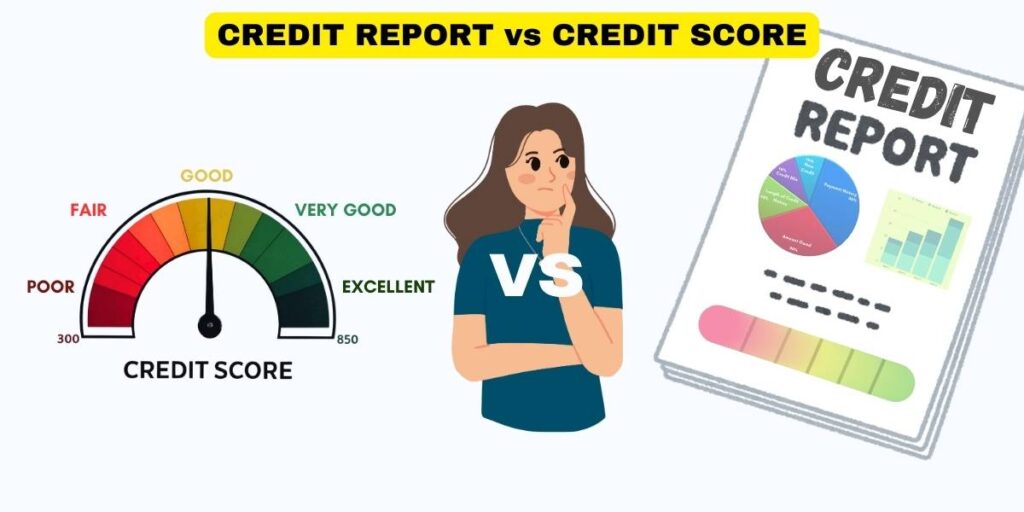Confused about credit report vs credit scores? Learn how they differ, why both matter for loans, and how to improve them;
Credit Report vs Credit Score:
If you’ve ever applied for a loan, rented an apartment, or even signed up for a cell phone plan, you’ve likely encountered the terms “credit report” and “credit score.” But what exactly are they, and how do they impact your financial life?
Let’s break down the differences, explain how they work together, and show you how to improve both—so you can unlock better loan terms and financial opportunities.
What Is a Credit Report?
A credit report is a detailed record of your credit history, compiled by credit bureaus (Experian, Equifax, TransUnion). Think of it as your financial résumé—it shows lenders how you’ve managed debt over time.
What’s Included in a Credit Report?
| Category | Details |
|---|---|
| Personal Info | Name, address, Social Security number, employment history |
| Credit Accounts | Credit cards, loans, mortgages, balances, payment history |
| Public Records | Bankruptcies, tax liens, foreclosures |
| Inquiries | List of lenders who checked your credit (hard vs soft inquiries) |
Why it matters: Errors on your credit report can lead to denied loans, higher insurance rates, or even lost job opportunities.
What Is a Credit Score?
A credit score is a three-digit number (usually 300–850) calculated from your credit report. It’s a quick snapshot of your credit risk, used by lenders to decide loan approvals, interest rates, and credit limits.
How Credit Scores Are Calculated
| Factor | Weight (FICO® Score) | Impact |
|---|---|---|
| Payment History | 35% | Late payments hurt your score the most. |
| Amounts Owed | 30% | High credit card balances lower your score. |
| Credit History | 15% | Older accounts improve your score. |
| New Credit | 10% | Multiple credit applications in a short time can lower your score. |
| Credit Mix | 10% | Having different types of credit (loans, cards) helps. |
Key Differences at a Glance
| Feature | Credit Report | Credit Score |
|---|---|---|
| What It Is | Detailed history of credit activity | Three-digit number based on that history |
| Who Creates It | Credit bureaus (Experian, Equifax, TransUnion) | Scoring models (FICO®, VantageScore®) |
| Free Access | Yes (annualcreditreport.com) | Sometimes (varies by service) |
| Used For | Manual reviews by lenders, landlords, employers | Quick risk assessment by lenders |
| Errors | Can include mistakes (e.g., wrong accounts) | Errors on reports lead to incorrect scores |
Credit Score Ranges: FICO vs VantageScore®
| Rating | FICO® Score Range | VantageScore® Range |
|---|---|---|
| Poor | 300–579 | 300–600 |
| Fair | 580–669 | 601–660 |
| Good | 670–739 | 661–780 |
| Very Good | 740–799 | 781–850 |
| Exceptional | 800–850 | N/A (Superprime: 781–850) |
Why Both Matter for Your Financial Health
- Credit Report: Errors here can cost you thousands in higher interest rates or denied loans.
- Credit Score: A low score can mean paying $5,000+ extra in interest on a car loan.
How to Improve Both
- Check Your Credit Report Annually
Get free reports at annualcreditreport.com and dispute errors. - Pay Bills on Time
Set up autopay to avoid missed payments. - Keep Credit Card Balances Low
Aim to use <30% of your credit limit. - Limit New Credit Applications
Multiple hard inquiries in a short period hurt your score. - Maintain Older Accounts
Closing old accounts shortens your credit history.
Final Thoughts
Your credit report and credit score work together to shape your financial opportunities. By understanding both—and taking steps to improve them—you can unlock better loan terms, lower interest rates, and greater financial freedom.
Ready to Take Control of Your Credit?
- Need to fix errors? Read: [How to Dispute Credit Report Mistakes]
- Want to boost your score? Check out: [Best Credit Cards for Building Credit]
- Confused about credit repair? Learn: [Credit Repair Scams to Avoid]

